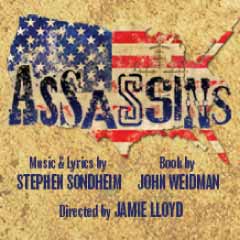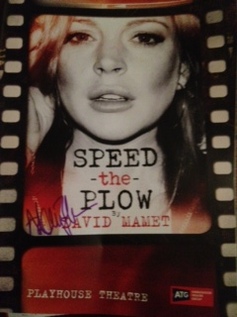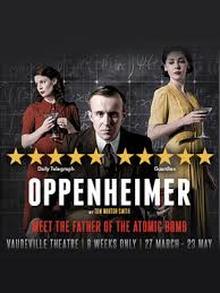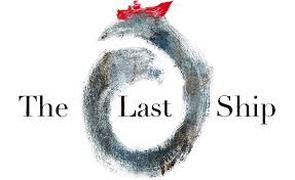 Final Meal of 2014: Excellent Food & Great Value at Manna, Londonby Randi / January 2, 2015
Final Meal of 2014: Excellent Food & Great Value at Manna, Londonby Randi / January 2, 2015First, the central character: “Johnny Booth was a handsome devil!” These lyrics are hella true in this production. Broadway’s Aaron Tveit is adoooorable. More importantly, he handles the vital role of John Wilkes Booth sublimely, being a charming and debonair Southerner who clearly conveys a base desire for ill-gained notoriety. Although his main action (killing Abraham Lincoln, obviously) is done early on, he hangs around to support the others, because, as the Balladeer sings early on, “Damn you, Johnny! You paved the way for other madmen to make us pay!” Booth pretty much started a trend in America, and so his presence is required throughout the show.
Despite his inherent evil, Booth seems the most stable of all the characters, and probably is. The most unstable is also my favorite. “Look on the bright side, not on the sad side…I am going to the Lordy”, sings Charles J. Guiteau, the most weirdly likable character in this production, probably because the actor, Andy Nyman, is so damn good in this role, petrifying but kind of lovable. Guiteau was executed for killing President Garfield, after being denied the ambassadorship to France, which he had long assumed would be given him when he requested it. Some of the lyrics to his big song actually came from the poem he wrote the day of his execution and recited on the gallows as he laughed and danced, before hanging. The poem was called “I am going to the Lordy”. Sondheim turned this into the most catchy, horrifyingly optimistic song that captures Guiteau’s, well, gallows humor and clear insanity. Here, Guiteau also sings and dances on the gallows, performing a cakewalk and an ever-intensifying song before swinging from the noose in front of us. It’s so disturbing and so powerful. Also, Nyman does the best American accent by a Brit that I’ve heard so far in London theatre.
Before deciding to kill the president, Guiteau writes books that don’t sell and he convinces himself and others that he’s the future Ambassador to France. By seeing our characters’ failures and blown ambitions, you start to feel for them. You think, this poor guy couldn’t catch a break, and yes obviously needs mental healthcare that no one is going to provide. The music and the stories lead you on a path to almost commiseration, and then hopefully you snap out of it and realize how f-ed up you have to be to consider making this turn. But that’s the genius of “Assassins”, showing history from their perspectives and forcing you to recognize their humanity.
Personal failures as well as professional failures take blame for coaxing some down this path. “I am unworthy of your love” is a duet between two strangers, Lynette “Squeaky” Fromme (Carly Bawden) and John Hinckley Jr. (Harry Morrison), the failed assassins of Gerald Ford and Ronald Reagan, respectively. The memorable and pretty lovely song shows how some are led towards awful deeds in trying to impress others. The show’s Hinckley is an odd man who can’t find love, in the all-too-familiar sense of men like the Santa Barbara killer who get angry and frustrated when women, whom they were told their whole lives that they as men were entitled to, rebuffed them. Our society’s continued view of women as playthings and pretty things that men should have a say over is creepily reflected in this character, as he decides to kill a president in order to impress a movie star enough that she’d actually know he existed (as opposed to, say, the modern version of men killing the women who threaten their world view).
Fromme, on the other hand, tries to assassinate Ford in order to impress her lover, Charles Manson, whom she believed was Jesus reincarnated. And if Jesus wishes for you to kill the president, you do that! (No, seriously, don’t, even if it’s really Jesus.) Luckily, she and Hinckley failed. In this production, Fromme’s failure is shown as mostly due to her ridiculosity of a partner in crime, played by British favorite Catherine Tate as Sara Jane Moore. It’s a smallish role but she’s hilarious. A lot of people think Tate plays it too over the top, but I found her antics necessary to brighten up all the dark psychology of the show. (Except when she accidentally shoots her dog. Not funny. Luckily a stuffed dog was used, so sort of funny.) Her best bits include her shooting practice on a bucket of KFC, after which she eats the chicken. But nothing is funnier than when Moore and Squeaky botch their assassination attempt so freaking badly that, in their mad rush to complete it in a crazy moving crowd, they are unable to reload and instead throw bullets at Ford while shouting ‘Bang!’ Amaaaazing.
The real brilliance of the show is demonstrating how a person’s disappointment in living a small life can lead to such a path, just to make some kind of name for himself. And we know this so well. Mental instability of all sorts leads many to commit mass atrocities because, as we know, our media will make perpetrators famous. Whenever the awful story of a school shooting or of President Lincoln’s final days is told, so too will the name of the murderers, or of Booth.
No one explains this better than Booth himself, who uses it as a selling point when trying to persuade our narrator, the Balladeer, whose identity becomes a beyond genius twist (that was added in the revival, and I can’t see the musical being as poignant without it). In the recording I know best, my balladeer was Neil Patrick Harris, so my favorite songs had a pop-star clarity and zest to them. Here, the Balladeer is sung like a twangy country singer by Jamie Parker, but it totally works and won me over. So the Balladeer has been on the sidelines all night, telling the tales of others most judgmentally – in the above-quoted “Ballad of Booth”, he reinforces that those madmen who have made us pay “have had their say, but only for a day….Angry men don’t write the rules and guns don’t right the wrongs. Hurts a while but soon the country’s back where it belongs.” But as things come to an end, the Balladeer is not so convinced that the country bounces back so easily, if ever, and he’s more open to discussion about leaving his moral high ground, not wanting to end things as a simple narrator strumming his guitar, but as someone who, like his subjects, will live forever in infamy as long as his target lives forever in fame. Booth tells him that their names will always go hand in hand, that just as Lincoln’s great life and deeds will never be studied without Booth’s being studied and remembered as well, so too will the next great Assassin in this way share the triumphs of his victim. It’s incredibly disturbing and true, that a killer can so easily usurp the greatness of his victim. (I wish so strongly for the media should stop reporting the names of people who commit mass shootings and the like, somehow, if it would make sense. Gaining such immediate fame is often the only goal, and I wish there was a way to not give these awful people the satisfaction of being remembered. (It would also be great if we had legit mental healthcare systems but that’s maybe more farfetched.))
All of this is demonstrated pretty remarkably by The Proprietor, the gun salesman and carnival runner, played hauntingly by Simon Lipkin, who represents a sort of universal id. He lures our characters into the darkness by reminding them of the show’s eerie twisted theme, that “Everybody’s got the right to be happy”. He opens the show with lines like, “Hey kid, failed your test? Dream girl unimpressed? Show her you’re the best – if you can shoot a president”, chillingly blunt lyrics that immediately set the disturbing and blackly humorous tone for the show.
That Sondheim makes you think all of this, makes you laugh and feel heartbroken at the world, all in a 100 or so minute musical is a testament to his genius. That this extremely difficult show is such a rousing success is a testament to the Menier, to this spectacular cast, and to this faultless production, which is now completely sold out, and rightly so. With any luck, it’ll transfer to mainstem West End so more people can appreciate how freaking great this show is.







